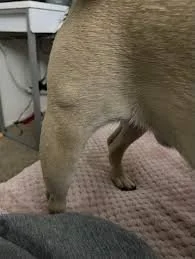Understanding Vaccine Reactions
Vaccines are one of the most effective tools in modern veterinary medicine. They protect dogs and cats from infectious diseases that can cause severe illness or death — including rabies, parvovirus, distemper, and panleukopenia.
However, like any medical treatment, vaccines can sometimes trigger side effects. Most are mild and short-lived, but in rare cases, a pet can experience a moderate or even severe reaction. Understanding why this happens — and what signs to look for — helps pet owners make informed decisions and know when to seek care.
The Science Behind Vaccine Reactions
Vaccines work by stimulating the immune system to recognize and respond to disease-causing organisms. This process “teaches” the body to build protection without causing illness.
In some animals, the immune system may react more strongly than intended, resulting in temporary inflammation or hypersensitivity.
Reactions can occur because of:
Immune sensitivity – The immune system may recognize vaccine components (proteins, adjuvants, or preservatives) as foreign.
Genetic or breed predispositions – Certain breeds (e.g., small dogs, certain white-coated cats) can be more prone to hypersensitivity reactions.
Age and health status – Young, senior, or immunocompromised pets may react differently.
Repeated exposure – Immune memory can sometimes lead to an exaggerated response with repeated vaccinations.
At Neighborhood Vet, we minimize these risks by selecting vaccines that meet the highest safety and purity standards and by customizing vaccination schedules based on your pet’s lifestyle and health.
Types of Vaccine Reactions
Mild Reactions (Common and Self-Limiting)
These are the most frequent and usually resolve within 24–72 hours.
Mild fever or lethargy
Soreness or swelling at the injection site
Temporary loss of appetite
Mild respiratory signs (sneezing or coughing after nasal vaccines)
These symptoms occur as part of the immune system’s normal response to stimulation. They typically don’t require treatment, but monitoring your pet and allowing rest can help recovery.
Moderate Reactions (Less Common, May Need Veterinary Attention)
Moderate reactions involve an allergic-type response or prolonged inflammation.
Facial swelling, hives, or rash
Persistent vomiting or diarrhea
Pain or swelling lasting more than 48 hours
Lameness or reluctance to move
Coughing or nasal discharge that worsens over several days
These reactions may need medical evaluation. Anti-inflammatory or antihistamine therapy is often effective in resolving symptoms quickly.
Severe Reactions (Rare but Serious)
Severe vaccine reactions are anaphylactic or systemic responses that require immediate emergency care.
Difficulty breathing or collapse
Pale or blue gums
Swelling of the face, throat, or entire body
Seizures or confusion
Sudden weakness or shock
Anaphylaxis typically occurs within minutes to an hour after vaccination. Emergency care and supportive treatment are critical to recovery.
Injection Site Reactions and Sarcomas
It’s normal for a small, firm lump to form at a vaccine injection site — this is a localized immune response and usually resolves within 2–3 weeks.
However, in very rare cases (primarily in cats), a vaccine-associated sarcoma may develop. This is a type of connective tissue tumor that forms at the site of repeated injections, including vaccines. The estimated risk is between 1 in 10,000 and 1 in 30,000 cats.
Veterinarians follow the “3-2-1 rule” for monitoring any post-vaccine lump in cats:
Persists for more than 3 months
Is larger than 2 cm (about 1 inch)
Continues to increase in size after 1 month
If any of these apply, the area should be evaluated by a veterinarian. At Neighborhood Vet, we minimize this risk by using vaccines formulated for reduced inflammation and injecting in strategic sites (such as lower limbs) where removal would be safer if ever needed.
Vaccine Safety at Neighborhood Vet (Savannah & Surrounding Areas)
At Neighborhood Vet, your pet’s safety is our priority. Every vaccine appointment begins with a full vitals check and a risk–benefit analysis — meaning we only vaccinate when your pet is healthy and when the vaccine is appropriate for their lifestyle and exposure.
We use vaccines tested for purity, safety, and duration of immunity, and we tailor schedules for each pet, not one-size-fits-all protocols.
If your pet experiences any side effects after a vaccine:
Call or text us at 912-775-WELL
We’ll guide you on whether monitoring at home is appropriate or if your pet should be rechecked.
Rechecks for suspected vaccine reactions are always provided at no charge — we want to ensure your peace of mind.
If your pet experiences severe symptoms outside clinic hours, please go directly to:
Savannah Vet ER (Open 24 hours)
335 Stephenson Ave, Savannah, GA 31405
(912) 355-6113
or
Urgent Pet Care
11102 Abercorn St Ste. A, Savannah, GA 31419
(912) 200-3985
Our Commitment
Vaccines save lives, but they should always be given thoughtfully.
At Neighborhood Vet, we believe in personalized, preventive care — guided by science, compassion, and a deep respect for your pet’s individuality.
Your pet’s health and safety are never routine to us.




